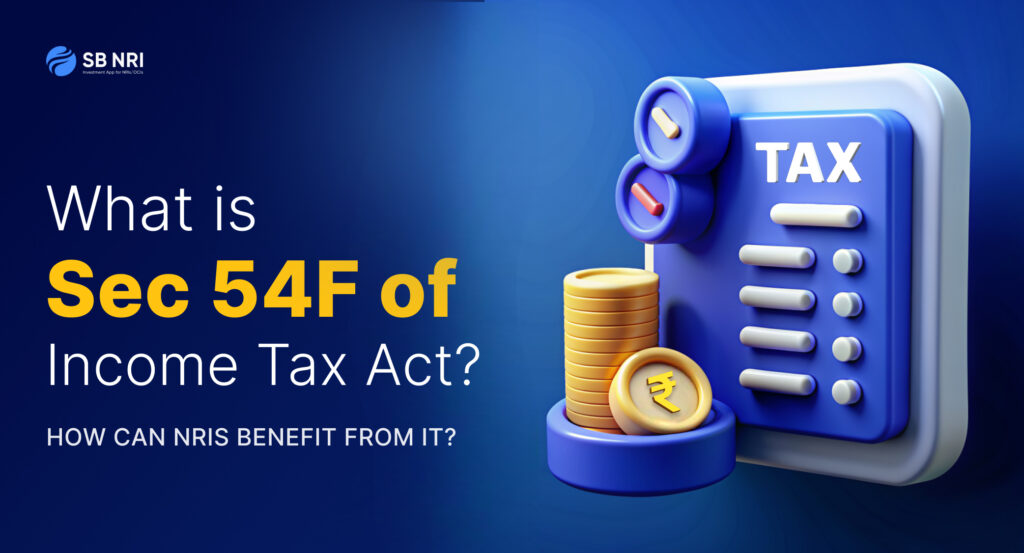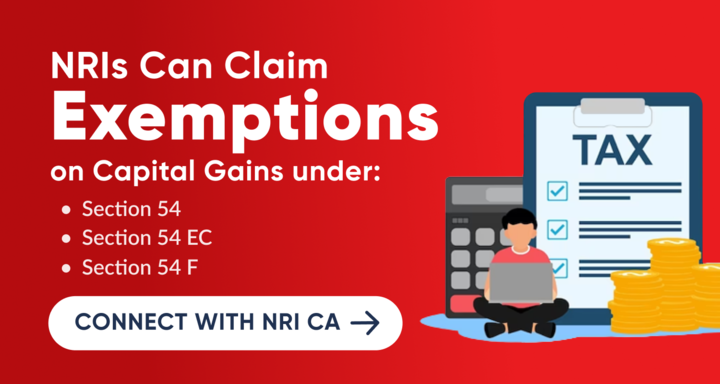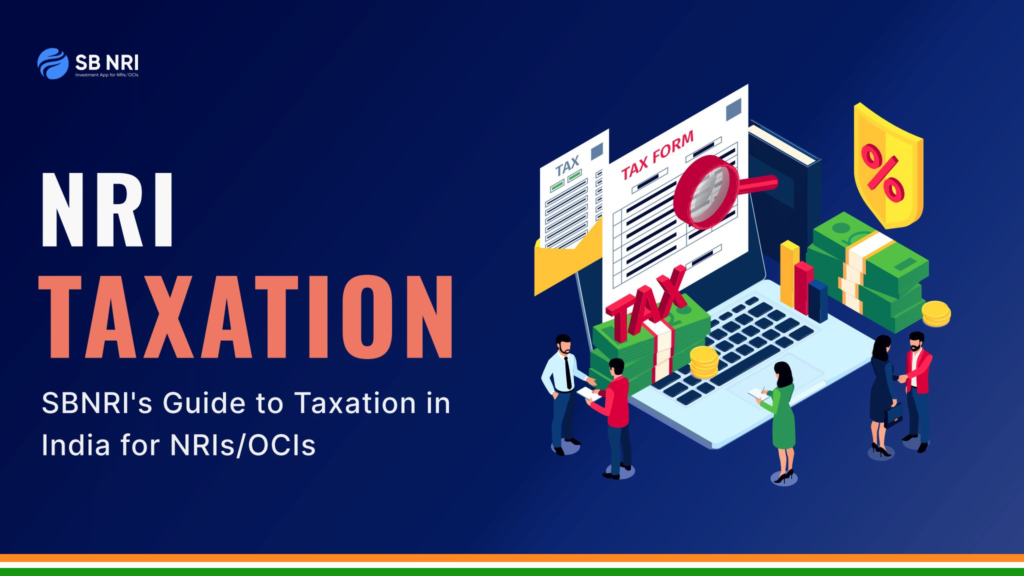
When it comes to investing in property and saving on taxes, Section 54F of the Income Tax Act is a significant provision that offers tax exemptions on long-term capital gains. This section can be especially beneficial for Non-Resident Indians (NRIs) and Overseas Citizens of India (OCIs) who want to optimize their tax liabilities while investing in Indian real estate. Let’s understand in detail the specifics of Section 54F and find out how NRIs can take advantage of this provision. But before that let’s understand what is capital gains.
What is Capital Gains?
Capital Gains refer to the profit earned from the sale of a capital asset, such as property, stocks, or bonds. The Income Tax Act categorizes capital gains into two types:
- Short-Term Capital Gains (STCG): Gains from the sale of a capital asset held for a short duration, typically less than 36 months. For certain assets like listed securities, the holding period is less than 12 months.
- Long-Term Capital Gains (LTCG): Gains from the sale of a capital asset held for more than 36 months. For listed securities, the holding period is more than 12 months.
The tax rate for STCG is generally higher compared to LTCG, making the latter more favorable for tax planning and investments.
Also read: TDS on Sale of Property by NRI in India [New Rates for 2024]
What is Section 54F of the Income Tax Act?
Section 54F allows individuals to claim tax exemptions on long-term capital gains if they reinvest the proceeds in a residential property. This can be particularly beneficial for those selling assets like land or stocks. Lots of NRIs own various assets in India and they can often benefit from long-term capital gains from non-residential properties. Section 54F helps them save on taxes and encourages property investment.
Also read: Long-Term Capital Gain Tax on Sale of Property in India

Understanding Section 54F
Section 54F provides an exemption on long-term capital gains arising from the sale of any capital asset other than a residential house, provided the proceeds are reinvested in purchasing or constructing a residential house in India. Here are the key conditions to qualify for this exemption:
- Long-Term Capital Asset: The asset sold should be a long-term capital asset, meaning it should have been held for more than 36 months.
- Reinvestment in Residential Property: The net sale proceeds should be reinvested in either purchasing a new residential house within one year before or two years after the date of transfer, or constructing a new residential house within three years after the date of transfer.
- Single Residential Property: The exemption is available only if the taxpayer does not own more than one residential house (other than the new one being purchased or constructed) on the date of transfer.
- Lock-in Period: The new property purchased or constructed should not be sold within three years of its acquisition or construction.
- Utilization of Sale Proceeds: If the entire sale proceeds are not utilized for purchasing or constructing the new residential house, the exemption is allowed proportionately.
Also read: Capital Gains Bonds for Tax Exemption under Section 54EC
Benefits of Section 54F for NRIs
NRIs can significantly benefit from Section 54F when managing their investments and tax liabilities in India. Here’s how:
- Tax Savings: By reinvesting the capital gains in a residential property in India, NRIs can claim an exemption from capital gains tax, thus reducing their overall tax liability.
- Investment in Indian Real Estate: This section encourages NRIs to invest in Indian real estate, offering them an opportunity to own property in their home country while availing tax benefits.
- Capital Asset Diversification: NRIs often have diversified portfolios across various countries. Investing in Indian real estate using Section 54F can enhance their portfolio diversity.
- Financial Planning: Leveraging this tax exemption can be a strategic move in long-term financial planning, allowing NRIs to allocate resources efficiently and potentially earn rental income or benefit from property appreciation in India.

Compliance and Documentation
To claim the benefits of Section 54F, NRIs need to maintain proper documentation and adhere to compliance requirements, including:
- Proof of Sale: Document the sale transaction of the original capital asset.
- Investment Proof: Provide evidence of the purchase or construction of the new residential house.
- Capital Gains Account Scheme: If the reinvestment is not immediate, the sale proceeds can be deposited in a Capital Gains Account Scheme to qualify for the exemption.
Calculate your TDS Refund with SBNRI’s TDS Refund Calculator
A TDS refund is the process of reclaiming the excess tax deducted at source by the payer if the actual tax liability of the taxpayer is lower than the TDS deducted. This situation typically arises when the income tax calculated on the total income is less than the TDS already deducted. To claim a TDS refund, taxpayers need to file an income tax return (ITR). The Income Tax Department processes the ITR and verifies the details. If the tax department finds that the TDS paid is more than the actual tax liability, the excess amount is refunded to the taxpayer.
You can easily find out how much tax refund you can get by calculating your TDS Refund from this TDS Refund Calculator.
Access SBNRI’s Exclusive NRI Taxation Guide

NRIs and OCIs can now access SBNRI’s exclusive NRI Taxation Guide covering in-depth information about DTAA, Gift Tax, Rental Income Tax, ITR Filing, Types of ITR Forms for NRIs, Capital Gain Tax, Income Tax, and more. The report will help you understand India taxation on mutual funds, other asset classes and how you can comply with the regulations.
Access NRI Taxation report here
Wrapping Up
Section 54 and Section 54F of the Income Tax Act offer valuable tax benefits for reinvesting long-term capital gains into residential properties. These offers not only help individuals and NRIs save on taxes but also promote investments in the real estate sector. By making properties more affordable and providing flexible investment options, they encourage the transfer from various asset classes that are uncertain depending upon the market conditions to real estate, supporting economic growth and offering a stable investment capital against market volatility.
Contact SBNRI
Due to a complicated tax system and recurrent amendments, understanding tax laws can be confusing and NRIs may be subject to additional fees or miss claiming deductions and other benefits. At SBNRI, we understand this struggle. You can download SBNRI App to connect with our NRI Tax Experts to know more about new TDS/ TCS rules for NRIs. You will also get end-to-end assistance related to NRI tax filing.
SBNRI will also help you get a lower TDS Certificate. You can also click on the button below to ask any questions. Visit our blog and YouTube Channel for more details.
FAQs
What is Section 54F exemption of Income Tax Act?
Section 54F of the IT Act allows an exemption on capital gains from selling any property other than a residential house. The taxpayer must invest the net sale proceeds from the old property into purchasing a new residential house.
How can I avoid capital gains tax on property sales?
Several exemptions under the Income Tax Act can help property sellers save a significant amount. You can reinvest the profit generated from sale of property for the purchase of another property to benefit from these exemptions. Additionally, investing in particular bonds, such as capital gains bonds, can help you obtain exemptions on long-term capital gains tax under Section 54EC.
How much capital gain is tax-free on property?
Tax Exemptions Available under Section 54, This exemption can be used by the taxpayer only once in their lifetime, and the capital gains must not exceed Rs. 2 crore.
What is the time limit for 54F?
Under Section 54F of the Income Tax Act, the long-term capital gains exemption will be revoked if an individual buys another house (apart from the one claimed for exemption) within 1 year of selling their capital asset or constructs another house within 3 years of the sale.
Do NRIs pay capital gains tax?
Yes, capital gains tax provisions for an NRI are similar to those for a resident individual except for the applicability of TDS provisions. Like resident investors, capital gains tax for an NRI depends on the holding period and the type of property sold.
How many times Section 54F can be used?
Under Section 54F of the Income Tax Act, individuals can claim the capital gains exemption multiple times if they use it to purchase the same residential property. The maximum deduction allowed is up to Rs. 10 crores.



